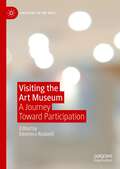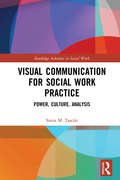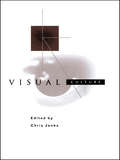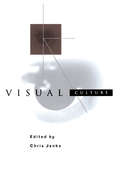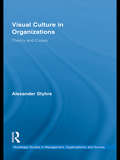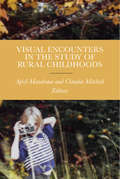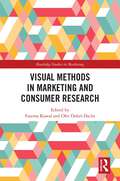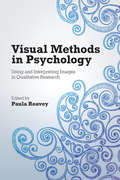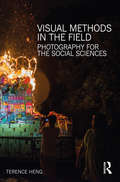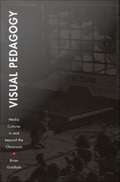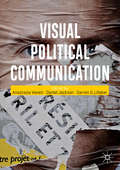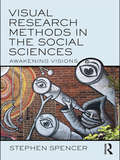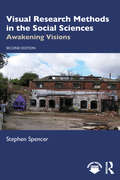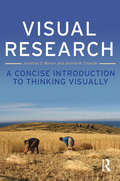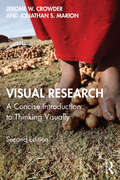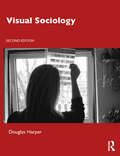- Table View
- List View
Visiting the Art Museum: A Journey Toward Participation (Sociology of the Arts)
by Eleonora RedaelliVisiting the Art Museum: A Journey Toward Participation is a book about the visitor experience. It is written as a companion for visitors to and inside the art museum. The volume engages readers in transforming a common experience, the museum visit, into a sophisticated epistemological inquiry. The study of the visitor experience through an epistemological approach consists of the untangling of the academic disciplines that study and inform each step of this experience: urban studies, architecture, design, art history, art education, and nonprofit management. This journey follows a transformative bottom-up trajectory from experiential to epistemological, and, finally, reveals itself as empowering. The book unfolds as an edited volume, with chapters by different authors who are enthusiastic scholars in each discipline and addresses undergraduate students as citizens, master’s students as professionals, and scholars as teachers and researchers. Each reader will discover a kaleidoscopic world made of ideas, values, and possibilities for participation.
Visual Communication for Social Work Practice: Power, Culture, Analysis (Routledge Advances in Social Work)
by Sonia M. TascónHow are we to understand how the dominance of visual images and representations in late modernity affects Social Work practice, research and education? Social workers are increasingly using still and moving images to illustrate their work, to create new knowledge, and to further specific groups’ interests. As a profession in which communication is central, visual practices are becoming ever more significant as they seek to carry out their work with, and for, the marginalised and disenfranchised. It is time for the profession to gain more critical, analytical, and practical knowledge of visual culture and communication, in order to use and create images in accordance with its central principle of social justice. That requires an understanding of them beyond representation. As important as this is, it is also where the profession’s scholarly work in this area has remained and halted, and thus understanding of the work of images in our practices is limited. In order to more fully understand images and their effects – both ideologically and experientially – social workers need to bring to bear other areas of study such as reception studies, visual phenomenology, and the gaze. These other analytical frames enable a consideration not only of images per se, but also of their effect on the viewer, the human spectators, and the subjects at the heart of Social Work. By bringing understandings and experiences in Film, Media, and Communications, Visual Communication for Social Work Practice provides the reader with a wide range of critically analytical frames for practitioners, activists, educators, and researchers as they use and create images. This invites a deeper knowledge and familiarity with the power dimensions of the image, thus aligning with the social justice dimension of Social Work. Examples are provided from cinema, popular media, but more importantly from Social Work practitioners themselves to demonstrate what has already been made possible as they create and use images to further the interpersonal, communal, and justice dimensions of their work. This book will be of interest to scholars, students, and social workers, particularly those with an interest in critical and creative methodologies.
Visual Culture
by Chris JenksIn Visual Culture the 'visual' character of contemporary culture is explored in original and lively essays. The contributors look at advertising, film, painting and fine art, journalism, photography, television and propaganda. They argue that there is only a social, not a formal relation between vision and truth.
Visual Culture
by Chris JenksIn Visual Culture the 'visual' character of contemporary culture is explored in original and lively essays. The contributors look at advertising, film, painting and fine art journalism, photography, television and propaganda. They argue that there is only a social, not a formal relation between vision and truth. A major preoccupation of modernity and central to an understadning of the postmodern, 'vision' and the 'visual' are emergent themes across sociology, cultural studies and critical theory in the visual arts. Visual Culture will prove an indispensable guide to the field.
Visual Culture Wars at the Borders of Contemporary China: Art, Design, Film, New Media and the Prospects of “Post-West” Contemporaneity (Contemporary East Asian Visual Cultures, Societies and Politics)
by Paul Gladston Beccy Kennedy-Schtyk Ming TurnerThis edited collection brings together essays that share in a critical attention to visual culture as a means of representing, contributing to and/or intervening with discursive struggles and territorial conflicts currently taking place at and across the outward-facing and internal borders of the People’s Republic of China. Elucidated by the essays collected here for the first time is a constellation of what might be described as visual culture wars comprising resistances on numerous fronts not only to the growing power and expansiveness of the Chinese state but also the residues of a once pervasively suppressive Western colonialism/imperialism. The present volume addresses visual culture related to struggles and conflicts at the borders of Hong Kong, the South China Sea and Taiwan as well within the PRC with regard the so-called “Great Firewall of China” and differences in discursive outlook between China and the West on the significances of art, technology, gender and sexuality. In doing so, it provides a vital index of twenty-first century China’s diversely conflicted status as a contemporary nation-state and arguably nascent empire.
Visual Culture in Organizations: Theory and Cases (Routledge Studies in Management, Organizations and Society)
by Alexander StyhreVision and visuality are two concepts widely discussed and debated in philosophy and social science literature. Some authors even suggest that the entire Western intellectual tradition is strongly shaped by the paradigm of vision; the inspection and analysis of specimens collected from social reality are regarded as the only legitimate source of truth. However, in organizations, a variety of visual practices are employed in for instance science-based innovation in for instance the pharmaceutical industry and in architect work. Such visual practices include the use of various technoscientific machinery and tools to more mundane uses of full-scale models and photos in architect work. In comparison to the various linguistic perspectives on organizations, vision and visuality remain surprisingly little theorized and examined in the organization literature. Visual Culture in Organizations offers an introduction to the literature on vision and visuality that is relevant to organizational theory (comparing and contrasting it to the well-documented area of linguistic theory in organizations), proposes a theoretical framework for visual culture in organizations, and provides empirical illustrations to the theoretical framework. The book shows that visual practices are a central procedure in the day-to-day routines of organizations and are long overdue for close examination.
Visual Encounters in the Study of Rural Childhoods
by Claudia Mitchell Eric Gottesman Naydene De Lange Relebohile Moletsane April Mandrona Bernard Chan Karren Eppley Wendy Ewald Sally Campbell Galman Diana Carolina Gomez Helle Stranfaard Jensen Renee Jackson Rahul Kamble Irina Kosterina Jonathan Kremser Barbara Turk Niskac Sara Nyhlen Katarina Gritli Nygren Katja Gillander-Gadin Eva Soderberg Kelly Royds Beth Shively Jennifer Vanderburgh Sheilah Wilson Holley WlodarczykVisual Encounters in the Study of Rural Childhoods brings together visual studies and childhood studies to explore images of childhood in the study of rurality and rural life. The volume highlights how the voices of children themselves remain central to investigations of rural childhoods. Contributions look at representations and experiences of rural childhoods from both the Global North and Global South (including U.S., Canada, Haiti, India, Sweden, Slovenia, South Africa, Russia, Timor-Leste, and Colombia) and consider visuals ranging from picture books to cell phone video to television.
Visual Marketing: A Practical Guide to the Science of Branding & Retailing
by Barbara E. Kahn Elizabeth N. JohnsonAs the world accelerates towards the digital realm post-pandemic, it has never been more important for marketers and designers to have a solid understanding of visual marketing and the key principles and concepts behind it.Visual Marketing analyses the post-pandemic digital transformation, including AI, taking place across an increasingly competitive marketing landscape. Against this background, the book utilises proven principles in consumer psychology, marketing, and neuroscience to propose creative and useful visual strategies to increase the effectiveness of marketing efforts, illustrating this with many contemporary real-world examples. Reflecting on observations around the radical disruption in the retail industry in particular, the authors introduce the “Kahn Retailing Success Matrix,” which has successfully guided marketing strategy across many industries. The book also highlights the significant influence of visual and physiological principles on how human observers see and interpret visual stimuli, and how applying these fundamental principles will provide marketers with incredible differential advantage in a customer-centric world. Readers will also gain in-depth understanding of how to use new measurement tools that rely on data analytics; choice and preference behaviour; eye tracking and other measures of attention; memory; and emotions to evaluate strategies and measure success. This innovative and incisive new textbook is a valuable resource for both undergraduate and postgraduate students of such subjects as Consumer Behaviour, Marketing Strategy, Visual Marketing, and Retailing.Online resources include course exercises, lecture slides, and suggested mini case studies. Please visit www.routledge.com/9781032731322
Visual Marketing: From Attention to Action (Marketing And Consumer Psychology Ser.)
by Michel Wedel Rik PietersThis comprehensive volume aims to further research and theory development in visual marketing. By bringing together leading researchers in the field, it strives to contribute to the establishment of visual marketing as a coherent discipline. The chapters represent an array of issues in visual marketing. They address three areas in theory: attention
Visual Mathematics and Cyberlearning
by Viktor Freiman Dragana Martinovic Zekeriya KaradagThis first book in the series will describe the Net Generation as visual learners who thrive when surrounded with new technologies and whose needs can be met with the technological innovations. These new learners seek novel ways of studying, such as collaborating with peers, multitasking, as well as use of multimedia, the Internet, and other Information and Communication Technologies. Here we present mathematics as a contemporary subject that is engaging, exciting and enlightening in new ways. For example, in the distributed environment of cyber space, mathematics learners play games, watch presentations on YouTube, create Java applets of mathematics simulations and exchange thoughts over the Instant Messaging tool. How should mathematics education resonate with these learners and technological novelties that excite them?
Visual Methods for Sensitive Images: Ethics and Reflexivity in Criminology On/Offline (Palgrave Studies in Crime, Media and Culture)
by Sidsel Harder Silje Anderdal BakkenThis edited book provides a toolbox for researchers and students working with sensitive images in criminological research on and offline. Across three sections on collecting, analysing and mediating sensitive visual data, the chapters cover a wide array of current examples and discussions of visual methods and ethics in contemporary, digital-life criminology. It reflects the experiences of influential and innovative scholars engaging in empirical analysis of images across various subfields within criminology, including with images that deal with crime, social problems and stigma. They emphasize the opportunity for gaining knowledge through visual analysis and include methodological discussions of how to approach such sensitive data material. Some chapters address visuals as data in mediated realities and the related methodological concerns. The book also contributes to discussing the various ethical sides to researching crime-related sensitive images, such as anonymity, consent, and access, but also relates to researcher reflexivity and protecting researchers' well-being.
Visual Methods in Marketing and Consumer Research (Routledge Studies in Marketing)
by Fatema KawafDespite the rising popularity of visual research methods, from images and collages to videos and animations, there is an imminent need for a book that can be a point of reference for learning about visual methods in the field of marketing and consumer research. This book offers a comprehensive outlook of visual research methods in the field, highlighting their value and offering a practical guide for researchers. Building on the experiences and discussions of both experienced and aspiring visual researchers, the editors present this book as a ‘go‑to’ guide for doing visual research in marketing and consumer research.This book encompasses nine chapters guiding the readers through the ABCs of visual research from philosophy to data collection and analysis, with a dedicated chapter on research dissemination. You can expect detailed discussions on the ontological and epistemological stance of visual research as well as an elaborate yet simple to follow guide of all aspects of data collection for various forms of visuals, be it static images, memes, collages, videos, animations and so on.The purpose of this book is not only to highlight the value of visual methods in consumer research but also to move this work on and offer a ‘go-to hands-on guide’ for novice visual researchers and PhD candidates who wish to conduct rigorous visual research. It will be a valuable resource not only for those particularly across marketing disciplines, including consumer research and behaviour, but also for visual researchers in fields such as sociology and anthropology.
Visual Methods in Psychology: Using and Interpreting Images in Qualitative Research
by Paula ReaveyThis comprehensive volume provides an unprecedented illustration of the potential for visual methods in psychology. Each chapter explores the set of theoretical, methodological, as well as ethical and analytical issues that shape the ways in which visual qualitative research is conducted in psychology. Using a variety of forms of visual data, including photography, documentary film-making, drawing, internet media, model making and collages, each author endeavors to broaden the scope for understanding experience and subjectivity, using visual qualitative methods. The contributors to this volume work within a variety of traditions including narrative psychology, personal construct theory, discursive psychology and conversation analysis, phenomenology and psychoanalysis. Each addresses how a particular visual approach has contributed to existing social and psychological theory in their topic area, and clearly outline how they carried out their specific research project. The contributors draw on qualitative sources of verbal data, such as spoken interview, diaries and naturalistic conversation alongside their use of visual material. This book provides a unique insight into the potential for combining methods in order to create new multi-modal methodologies, and it presents and analyses these with psychology specific questions in mind. The range of topics covered includes sexuality, identity, group processes, child development, forensic psychology, race, and gender, making this volume a vital contribution to psychology, sociology and gender studies.
Visual Methods in the Field: Photography for the Social Sciences
by Terence HengThe use of images, particularly photography, has been steadily gaining popularity in academia, but there has not yet been a book that deals with the act and process of photo-taking in the field. Drawing upon 21 years of photographic experience and sociological research, Terence Heng’s immersive and narrative style will: introduce photography as a qualitative method; discuss the intricacies of, challenges in and opportunities for using a camera in the field; explore common themes and topics in social science research, including photographing rituals, space, people and objects; advise on navigating the always evolving technological landscapes of traditional, digital and mobile photography. Visual Methods in the Field: Photography for the Social Sciences is a photography guide written for researchers by a researcher. Using in-depth ethnographic case studies from research done in various urban environments, this book will act as a crucial bridge for students in geography, sociology, education, media studies and other social sciences to incorporate photography into their research repertoire.
Visual Methods with Children and Young People: Academics and Visual Industries in Dialogue (Studies in Childhood and Youth)
by Eve Stirling Dylan Yamada-RiceThis volume focuses on using visual research methods with children and young people. Featuring insights from academic experts and established professionals from visual industries, it explores a range of issues from visual ethics to children's interaction with place.
Visual Pedagogy: Media Cultures in and Beyond the Classroom
by Brian GoldfarbIn classrooms, museums, health clinics and beyond, the educational uses of visual media have proliferated over the past fifty years. Film, video, television, and digital media have been integral to the development of new pedagogical theories and practices, globalization processes, and identity and community formation. Yet, Brian Goldfarb argues, the educational roles of visual technologies have not been fully understood or appreciated. He contends that in order to understand the intersections of new media and learning, we need to recognize the sweeping scope of the technologically infused visual pedagogy--both in and outside the classroom. From Samoa to the United States mainland to Africa and Brazil, from museums to city streets, Visual Pedagogy explores the educational applications of visual media in different institutional settings during the past half century. Looking beyond the popular media texts and mainstream classroom technologies that are the objects of most analyses of media and education, Goldfarb encourages readers to see a range of media subcultures as pedagogical tools. The projects he analyzes include media produced by AIDS/HIV advocacy groups and social services agencies for classroom use in the 1990s; documentary and fictional cinemas of West Africa used by the French government and then by those resisting it; museum exhibitions; and TV Anhembi, a municipally sponsored collaboration between the television industry and community-based videographers in São Paolo, Brazil. Combining media studies, pedagogical theory, and art history, and including an appendix of visual media resources and ideas about the most productive ways to utilize visual technologies for educational purposes, Visual Pedagogy will be useful to educators, administrators, and activists.
Visual Political Communication
by Daniel Jackson Darren G. Lilleker Anastasia VenetiThis edited volume offers a theoretically driven, empirically grounded survey of the role visual communication plays in political culture, enabling a better understanding of the significance and impact visuals can have as tools of political communication. The advent of new media technologies have created new ways of producing, disseminating and consuming visual communication, the book hence explores the theoretical and methodological underpinnings of visual political communication in the digital age, and how visual communication is employed in a number of key settings. The book is intended as a specialist reading and teaching resource for courses on media, politics, citizenship, activism, social movements, public policy, and communication.
Visual Research Methods in Educational Research
by Barbara Pini Julianne MossHave you noticed there is a burgeoning take up of visual research in education? Are you considering using visual research as part of your next research project or revitalising your research methods course? For researchers who are new to the field of VRMs in education there is little critical literature on the subject. This book addresses the gap in the literature and brings together some of the leading educational researchers engaging and reflecting on the visual from Australia, the UK and Canada. Encapsulated in a single volume, this book sets out theoretically grounded discussions of the possibilities and challenges of the approach for educational researchers around four key themes: images of schooling, performing pedagogy, power and representation and ethical issues in educational research.
Visual Research Methods in the Social Sciences: Awakening Visions
by Stephen SpencerVisual Research Methods is a guide for students, researchers and teachers in the social sciences who wish to explore and actively use a visual dimension in their research. This book offers an integrated approach to doing visual research, showing the potential for building convincing case studies using a mix of visual forms including: archive images, media, maps, objects, buildings, and video interviews. Examples of the visual construction of ‘place’, social identity and trends of analysis are given in the first section of the book, whilst the essays in the second section highlight the astonishing creativity and innovation of four visual researchers. Each detailed example serves as a touchstone of quality and analysis in research, with themes ranging from the ethnography of a Venezuelan cult goddess to the forensic photography of the skeleton of a fourteenth-century nobleman. They give a keen sense of the motives, philosophies and benefits of using visual research methods. This volume will be of practical interest to those embarking on visual research as well as more experienced researchers. Key concerns include the power of images and their changing significance in a world of cross – mediation, techniques of analysis and ethical issues, and how to unlock the potential of visual data for research.
Visual Research Methods in the Social Sciences: Awakening Visions
by Stephen SpencerVisual Research Methods in the Social Sciences: Awakening Visions is an indispensable resource for students, researchers and teachers seeking to use visual sources in their research and understand how images work. This fully updated edition adds questions and activities for studies and many new images and models as well as additional exploration of social and theoretical contexts and examples of current visual and multimodal research.Due to the proliferation of image-centric social media and the growing potential for ‘fake news’, being able to critically assess media and other visual messages is more important than ever. For researchers embarking on visual research this book offers useful practical guidance and real-world examples from seasoned researchers exploring cultures as varied as: religious cults in Venezuela, the Beer Can Regatta in Darwin, Mapuche Indians in Chile and graffiti artists in Sheffield. It offers an integrated approach to visual research, building compelling case studies using a wide range of visual forms, including: archive images, media samples, maps, objects, video, photographs and drawings alongside traditional qualitative approaches. Examples of the visual construction of ‘place’, representations of social identities and different approaches to analysis are explored in the first section of the book, whilst the essays in the second section highlight the creativity and innovation of four leading visual researchers. This new edition will prove valuable for both experienced visual researchers and those embarking on visual research in the social sciences for the first time.
Visual Research: A Concise Introduction to Thinking Visually
by Jonathan S. Marion Jerome W. CrowderVisual Research: A Concise Introduction to Thinking Visually is the first text to present a concise overview of the significant ethical, theoretical, and practical considerations for conducting research with images. The capacity to take photos and video on handheld devices and the ability to store, post, and share such imagery online all offer tremendous opportunities for social research. The rapid development and popularity of such technology means that little technological proficiency is required, and even less theoretical and ethical consideration. This book provides an accessible introduction to doing visual research in the social sciences. Beginning with ethical considerations, this book highlights the importance of thinking visually before engaging in visual research. Further themes involve creating, organizing, and using images and are presented so as to help readers think about and work with their own visual data. Boxed case studies and further reading suggestions enhance the utility of this primer. Concise and highly focused, Visual Research will be an invaluable resource for visual, media, and communications students and researchers and others interested in visual research in the social sciences.
Visual Research: A Concise Introduction to Thinking Visually
by Jonathan S. Marion Jerome W. CrowderVisual Research: A Concise Introduction to Thinking Visually 2nd Edition provides an accessible introduction to doing visual research in the social sciences. Beginning with ethical considerations, this book highlights the importance of thinking visually before engaging in visual research. Further themes involve creating, organizing, and using images and are presented so as to help readers think about and work with their own visual data. This fully updated second edition includes new case studies, updated discussions regarding the ethics of social media and online content, new technology and an expansion to include new material on museum, public and applied work. Concise and highly focused, Visual Research is an invaluable resource for visual, media, and communications students and researchers and others interested in visual research in the social sciences.
Visual Sociology
by Douglas HarperVisual sociology has been part of the sociological vocabulary since the 1970s, but until now there has not been a comprehensive text that introduces this area. Written by one of the founding fathers in the field, Visual Sociology explores how the world that is seen, photographed, drawn, or otherwise represented visually is different from the world that is represented through words and numbers. Doug Harper’s exceptional photography and engaging, lively writing style will introduce: visual sociology as embodied observation visual sociology as semiotics visual sociology as an approach to data: empirical, narrative, phenomenological and reflexive visual sociology as an aspect of photo documentary visual sociology and multimedia. This definitive textbook is made up of eleven chapters on the key topics in visual sociology. With teaching and learning guidance, as well as clear, accessible explanations of current thinking in the field, this book will be an invaluable resource to all those with an interest in visual sociology, research methods, cultural geography, cultural theory or visual anthropology.
Visual Sociology
by Douglas HarperThis new version of the authoritative textbook in the field of visual sociology focuses on the key topics of documentary photography, visual ethnography, collaborative visual research, visual empiricism, the study of the visual symbol and teaching sociology visually. This updated and expanded edition includes nearly twice as many images and incorporates new in-depth case studies, drawing upon the author’s lifetime of pioneering research and teaching as well as the often neglected experiences of women and people of color. The book examines how documentary photography can be useful to sociologists, both because of the topics examined by documentarians and as an example of how seeing is socially constructed. Harper describes the exclusion of women through much of the history of documentary photography and the distinctiveness of the female eye in recent documentary, a phenomenon he calls "the gendered lens". The author examines how a visual approach allows sociologists to study conventional topics differently, while offering new perspectives, topics and insights. For example, photography shows us how perspective itself affects what we see and know, how abstractions such as "ideal types" can be represented visually, how social change can be studied visually and how the study of symbols can lead us to interpret public art, architecture and person-made landscapes. There is an extended study of how images can lead to cooperative research and learning; how images can serve as bridges of understanding, blurring the lines between researcher and researched. The important topic of reflexivity is examined by close study of Harper’s own research experiences. Finally, the author focusses on teaching, offering templates for full courses, assignments and projects, and guides for teachers imagining how to approach visual sociology as a new practice. This definitive yet accessible textbook will be indispensable to teachers, researchers and professionals with an interest in visual sociology, research methods, cultural theory and visual anthropology.
Visual Sociology: Practices and Politics in Contested Spaces (Routledge Advances In Sociology Ser. #91)
by Dennis Zuev Gary BratchfordThis book provides a user-friendly guide to the expanding scope of visual sociology, through a discussion of a broad range of visual material, and reflections on how such material can be studied sociologically. The chapters draw on specific case-study examples that examine the complexity of the hyper-visual social world we live in, exploring three domains of the ‘relational image’: the urban, social media, and the aerial. Zuev and Bratchford tackle issues such as visual politics and surveillance, practices of visual production and visibility, analysing the changing nature of the visual. They review a range of methods which can be used by researchers in the social sciences, utilising new media and their visual interfaces, while also assessing the changing nature of visuality. This concise overview will be of use to students and researchers aiming to adopt visual methods and theories in their own subject areas such as sociology, visual culture and related courses in photography, new-media and visual studies.
